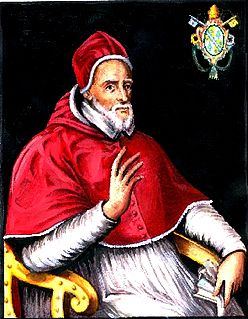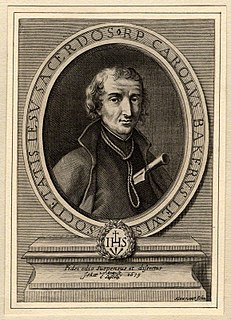
Pope Gregory XIV, born Niccolò Sfondrato or Sfondrati, was Pope from 5 December 1590 to his death in 1591.

Pope Innocent IX, born Giovanni Antonio Facchinetti, was Pope from 29 October to 30 December 1591.
Blessed John Story was an English Roman Catholic martyr and Member of Parliament. Story escaped to Flanders in 1563, but seven years later he was lured aboard a boat in Antwerp and abducted to England, where he was imprisoned in the Tower of London, and subsequently executed at Tyburn on a charge of treason.
Saint John Boste is a saint in the Roman Catholic Church, and one of the Forty Martyrs of England and Wales.
Saint Thomas Garnet was a Jesuit priest who was executed in London. He is the protomartyr of Saint Omer and therefore of Stonyhurst College. He was executed at Tyburn and is one of the Forty Martyrs of England and Wales.

Chingle Hall is a grade II listed manor house in the township of Whittingham near Preston, England.
Blessed John Larke was an English Catholic priest and martyr, who was executed during the reign of Henry VIII. Dr Larke was a notable personal friend of St Thomas More, Lord High Chancellor of England.

David Lewis was a Jesuit Catholic priest and martyr who was also known as Charles Baker. Lewis was canonized by Pope Paul VI in 1970 as one of the Forty Martyrs of England and Wales and is venerated as a saint in the Catholic Church.
A priest hunter was a person who, acting on behalf of British forces, spied on or captured Catholic priests during Penal Times.
The Eighty-five Martyrs of England and Wales are a group of men who were executed on charges of treason and related offences in the Kingdom of England between 1584 and 1679. Of the eighty-five, seventy-five were executed under Jesuits, etc. Act 1584.
Robert Nutter was an English Catholic priest, Dominican friar and martyr. He was beatified in 1987.
Edward Bamber was an English Roman Catholic priest. He was beatified in 1987.
John Finch was an English Roman Catholic farmer. He is a Catholic martyr, beatified in 1929.
Edward Morgan was a Welsh Roman Catholic priest and martyr.
William Andleby (Anlaby) was an English Roman Catholic priest. He is a Catholic martyr, beatified in 1929.
William Dean or Deane was an English Roman Catholic priest. He is one of the Catholic martyrs, beatified in 1929.
John Mush was an English Roman Catholic priest, the confessor to Margaret Clitherow.
Robert Singleton may refer to:
During the English reformation a number of men were executed at Lancaster in England as a consequence of their Catholic faith. They are commonly referred to as the Lancaster Martyrs and are commemorated locally by the Lancaster Martyrs Memorial Stone which may be found close to the centre of Lancaster city.
The public domain consists of all the creative works to which no exclusive intellectual property rights apply. Those rights may have expired, been forfeited, expressly waived, or may be inapplicable.

The Dictionary of National Biography (DNB) is a standard work of reference on notable figures from British history, published since 1885. The updated Oxford Dictionary of National Biography (ODNB) was published on 23 September 2004 in 60 volumes and online, with 50,113 biographical articles covering 54,922 lives.











